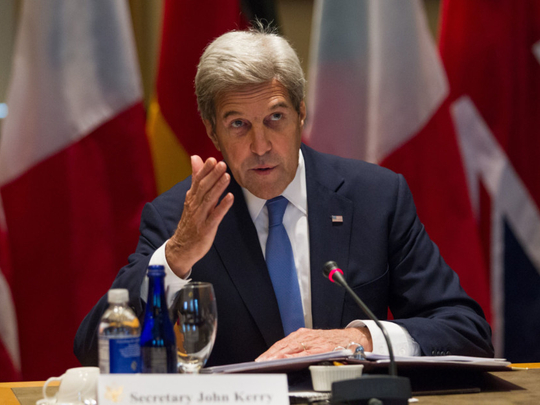
If you’ve ever wondered how United States Secretary of State John Kerry understands diplomacy, the waiting is over. Last Thursday, at the Aspen Institute’s Washington Ideas Forum, Steve Clemons of the Atlantic pried it out of America’s top diplomat: What exactly is the “John Kerry secret sauce?”
There are interests and values, Kerry told the audience. “You may have tension with the values because of the level of the interest, or the values may be — I mean, the Holocaust or Rwanda — which is also relevant to the debate about Syria, by the way, the killings and the torture and the barrel bombs and the gas.”
But then we got that secret sauce. After you figure out those values and interests, “you have to figure out whether you can find in the adversaries a meeting of the minds on any of the interests and/or values”, he said. “And that mixes differently with different people at different times.”
First, let’s state off the bat that what Kerry said is like a football coach saying, “We just want to go out there and try to put more points on the board than the other guys.” Everyone knows that states have values and interests and that diplomacy demands an assessment of whether one’s adversaries share any of those interests or values.
Kerry’s weakness is that he never gets to the point where he concludes an adversary doesn’t share America’s interests and values. He just keeps engaging. Take Russia’s Foreign Minister Sergei Lavrov. Even after the horror of the recent incident when the Russians and Syrians bombed an aid convoy that sought to deliver food and medicine to the besieged city of Aleppo, Kerry can’t quite end the talks. “I think we’re on the verge of suspending the discussion,” he said. The verge!
Chemical weapons
Then there is the stubborn fact that it’s difficult to find places in the world where the US has advanced its interests or values in the last four years. Kerry spent a year and a half on the Israeli-Palestinian peace process, with no results. In 2013, after making the case to Congress that Syrian President Bashar Al Assad’s gassing of civilians in Syria was an atrocity akin to the Nazis, he negotiated a deal to remove those chemical weapons that nonetheless allowed the regime to continue to drop barrel bombs of chlorine.
In the South China Sea, China builds artificial islands and militarises them. In Europe, Russia has annexed Crimea. Iraq is still trying to build a political consensus within the state to fight Daesh (the self-proclaimed Islamic State of Iraq and the Levant). The Afghan government is losing territory to the Taliban.
Clemons acknowledged all of this in a broad sense when he asked Kerry about the perception that the world is beginning to doubt America’s staying power. “I hear this and I hear people allege that the United States is retrenching and that we’re somehow pulling back,” Kerry said.
But he assured that this wasn’t true: “I think if you measure all of American history, there has never been a moment where the United States is more engaged in more places simultaneously on as significant a number of complicated issues as we are today.”
Notice that Kerry is not touting how America is advancing its values or interests. Rather, he’s making the unremarkable claim that the US is engaged in lots of global crises all at once. I hope the committee awards him the Nobel Prize for Participation.
Then Kerry ticked off a bunch of places where he thinks US diplomacy has succeeded. This includes Afghanistan, which is a success because the government in Kabul hasn’t totally collapsed: “It’s complicated, difficult, but we’ve been able to sustain the effort in Afghanistan.”
US diplomacy in the South China Sea counts as success because “we’ve held that from becoming a major conflict”. In Ukraine, “the sanctions worked”. In Yemen, “we’re on the verge maybe of a ceasefire there”. In Libya, a failed state and safe haven for a wide swath of radicals, “We’re able to try to grow the capacity, the sustainability of that government. It’s very tricky ... It’s complicated. There are extremists there.”
In fairness to Kerry, he also mentioned the fact that relief efforts saved perhaps a million lives from Ebola, and that many African children are now growing up without the scourge of Aids. On the latter, he did not mention a few major factors: Much cheaper Aids medication has come on the market and Obama’s predecessor, George W. Bush, invested billions in trying to address the problem.
Most consequential diplomacy
If this overview counts as success, I would hate to see failure. But you have to credit Kerry for never becoming embittered or discouraged. This brings us to Kerry’s most consequential diplomacy: The Iran nuclear deal.
Kerry explained that for now, the pact has held. He said that he had personally met with banks to try to assuage their fears about doing business with Iran, but the Iranians are still worried they have not seen more benefits. There’s also a tension between the moderates and the hardliners in Tehran, a line we hear from Kerry all the time. “It will remain complicated,” he said.
When asked if he was proud of the Iran deal, Kerry demurred. There was a time when Obama’s pride about the Iran deal verged on gloating. Today, Kerry understands that he negotiated a deal with an Iranian leader who can’t or won’t end his country’s hostility towards the US and its allies. This is a problem, because most of the limits on nuclear fuel production are lifted in the next nine to 14 years.
That’s when we’ll find out whether this bargain advanced America’s interests and values.
— Bloomberg
Eli Lake is a Bloomberg View columnist writing about politics and foreign affairs.










